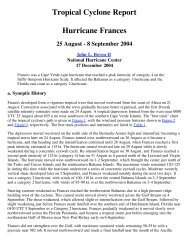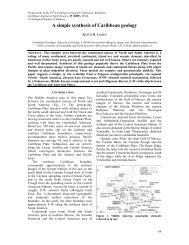Medical Sciences - University of the West Indies
Medical Sciences - University of the West Indies
Medical Sciences - University of the West Indies
Create successful ePaper yourself
Turn your PDF publications into a flip-book with our unique Google optimized e-Paper software.
The Jamaica rotavirus experience; Emerging infectious<br />
diseases and bioterrorism; HIV/AIDS - epidemiology,<br />
natural history, evaluation and treatment<br />
and prevention including vaccine trials.<br />
EPID6201 Epidemiology 2<br />
This module aims to provide an advanced under-<br />
standing <strong>of</strong>, and confidence to chose and execute,<br />
study design, analysis and interpretation <strong>of</strong> epidemiological<br />
studies and to understand epidemiological<br />
methods applied to public health. Content areas<br />
include definition <strong>of</strong> cases in epidemiological studies,<br />
rates (including Standardization) and measures<br />
<strong>of</strong> frequency and effect (risk), measures <strong>of</strong> public<br />
health impact (population attributable risk and number-needed-to-treat,<br />
study design, planning and<br />
execution, developing instruments, achieving good<br />
measurement technique and reducing random error,<br />
bias, confounding, data management and analysis,<br />
measures <strong>of</strong> reliability (e.g. Kappa statistics), validity<br />
(sensitivity, specificity, predictive validity, likelihood<br />
ratio, receiver operating characteristic (ROC)<br />
curves, screening and surveillance, including comparison<br />
and analysis <strong>of</strong> routine data, causality philosophical<br />
(inductive and deductive reasoning) and<br />
ma<strong>the</strong>matical basis (probability concepts) and decision<br />
making.<br />
EPID6202 Statistical Methods in Epidemiology<br />
This module aims to equip students with <strong>the</strong> skills<br />
needed to analyze and interpret data from cohort,<br />
case-control and cross-sectional studies by crosstabulation,<br />
stratification and regression and introduce<br />
<strong>the</strong>m to <strong>the</strong> analysis <strong>of</strong> large, population-based<br />
datasets. Content areas include analysis <strong>of</strong> cohort<br />
studies using classical methods.<br />
Stratification, confounding and interaction, design issues<br />
in case-control studies, analysis <strong>of</strong> case control<br />
studies using classical methods, matching in case<br />
control studies, likelihood <strong>the</strong>ory, logistic regression<br />
for <strong>the</strong> analysis <strong>of</strong> case-control, cross-sectional and<br />
fixed cohort studies, regression methods for casecontrol<br />
studies (Unconditional and conditional logistic<br />
regression), advanced design issues in case-control<br />
studies, regression methods for cohort studies<br />
and survival analysis. Assessing goodness <strong>of</strong> fit.<br />
Multiplicative and additive models. Attributable fractions.<br />
Meta-analysis and systematic reviews, survey<br />
analysis - weighted data, analysis <strong>of</strong> clustered data,<br />
repeated measures, design effects, dealing with<br />
missing data.<br />
EPID6203 Data Management for<br />
Epidemiological Studies<br />
The module aims to give students <strong>the</strong> practical skills<br />
to create, check and manage a database suitable for<br />
epidemiological studies.<br />
Content areas include Data entry/data entry verification,<br />
data quality and data checking, data management<br />
and manipulation, data analysis and data summary<br />
and presentation.<br />
GRADUATE STUDENTS INFORMATION GUIDE 2011/2012 95<br />
FACULTY OF MEDICAL SCIENCES

















